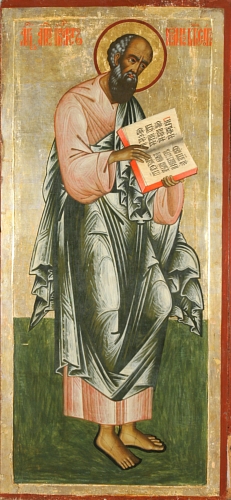 Although outside sources concerning the historical background of the biblical times are not infallible like the Holy Scriptures, it's good to do some research as to what scholars have found what was most likely going on around the time a biblical letter was written. For example, we see in Peter's first epistle that his letter was written to those who were spread out in "Pontus, Galatia, Cappadocia, Asia, and Bithynia." And scholars believe that he put it in this form because this was most likely the route in which the letter would be passed on. And so if you look at a Bible map, you'll see that it could very well be the reason. I took a seminary class last week on John's epistles and was surprised by the scholarship done on what seemed to be going on around the time of the letters being composed. Here's a few tidbits of information as to what John Stott and D.A. Carson have concluded.
Although outside sources concerning the historical background of the biblical times are not infallible like the Holy Scriptures, it's good to do some research as to what scholars have found what was most likely going on around the time a biblical letter was written. For example, we see in Peter's first epistle that his letter was written to those who were spread out in "Pontus, Galatia, Cappadocia, Asia, and Bithynia." And scholars believe that he put it in this form because this was most likely the route in which the letter would be passed on. And so if you look at a Bible map, you'll see that it could very well be the reason. I took a seminary class last week on John's epistles and was surprised by the scholarship done on what seemed to be going on around the time of the letters being composed. Here's a few tidbits of information as to what John Stott and D.A. Carson have concluded.Some of you may be familiar with the heresy called Gnosticism (gnosis: Greek for "knowledge"). They believed that salvation was obtained by gaining proper knowledge. Gnosticism was formed post-Christianity, but was developed from the Greek view of dualism (matter is bad, spiritual is good). Obviously, this goes against the Christian's view of a) Creation; b) Christ's incarnation; c) Christ's resurrection; d) God's providence--to name some. As time progressed, some Gnostics developed into a system called Proto-Gnostics. These Proto-Gnostics divided all humans into three different categories: 1) Really spiritual; 2) Potentially spiritual; 3) No chance for spirituality, indistinguishable from animals. Hence, since it was all about gaining proper knowledge, it didn't matter what you did with the body--as long as you were increasing in knowledge more and more spiritual things.
Throughout 1 John you'll see three different types of tests: doctrinal, moral, and social. Doctrinal tests can be seen in verses like 1 John 2:22 "Who is the liar but he who denies that the Christ is Jesus?" Almost every translation I've read puts it the other way, that the liar denies that "Jesus is the Christ." But, D.A. Carson thinks it's rendered properly in the latter form, not only for grammatical reasons in the Greek, but that it fits with John attacking a certain Proto-Gnostic heresy: that the Christ and Jesus were not the same. They taught that the Christ came upon Jesus at his baptism and left him during the crucifixion (read about a guy named Cerinthus). So whenever you come across a test in 1 John referencing doctrinal concerns, it's going against the backdrop of Proto-Gnostic false teachings about the person of Jesus.
Secondly, the moral tests are seen in how a person responds to God's commandments can be seen in 1 John 1:5-2:6; 2:29; 3:4-10; etc. This is an attack to the Proto-Gnostic do-whatever-you-want attitude since morality is not even a concern. Therefore John says whoever isn't obeying God's commands abides in lawless living.
Thirdly, the social tests are seen in how one treats his neighbor, the "one another" commands of 1 John (2:10, 3:10-23, etc.) "Anyone who does not love does not know God, because God is love (4:10)." The Proto-Gnostics were being unloving in separating all humanity into three categories: two being inefficient (one completely and the other partially), and then people like themselves who were at the top of the pyramid, the noble ones with all the knowledge. This degradation of humanity shows that they didn't "consider others better than themselves" as Paul puts it in Philippians 2. They loved themselves more than others. And therefore John can say without hesitation that if anyone says he loves God yet hates his brother...he is a liar (4:20).
Interesting, isn't it? I hope you've been blessed by this overview of what was going on around the time John wrote these epistles. Be blessed and feel free to send any questions you have my way.


No comments:
Post a Comment